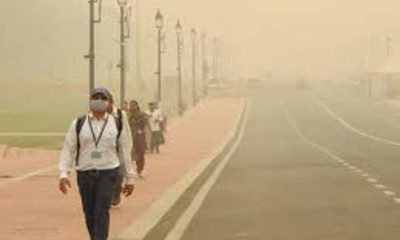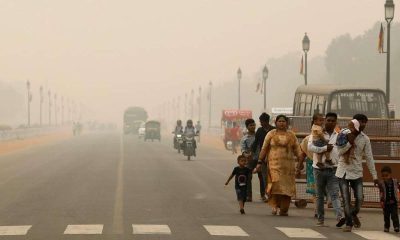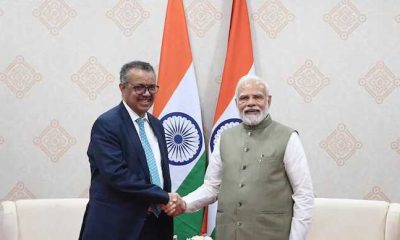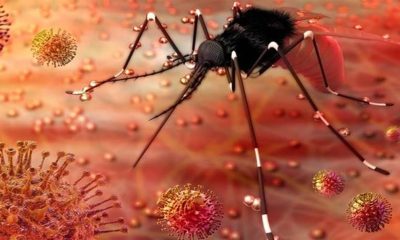India News
Should India ban asbestos?

[vc_row][vc_column][vc_column_text]
Cancer caused by merely inhaling an asbestos fibre is looming like an epidemic in developing countries, including India.
By Rashme Sehgal
White Asbestos, also known as chrysotile asbestos, is a proven carcinogen that kills 30 people each day in India. The WHO has found it to be so carcinogenic that it has calculated that over 100,000 people die from exposure to it every year. Late Environment Minister Anil Madhav Dave had spoken out against its use and had demanded it be phased out.
The first step towards phasing it out is to have chrysotile asbestos defined as a hazardous substance, as has already been done by the World Health Organisation, the International Labour Organization and 31 scientist-members of the United Nations Chemical Review Committee.
So while the Central and some state pollution control boards have declared it to be a hazardous substance, the Central government has shied away from banning this toxic material.
This conflicting stand was reflected at the all-important Conference of Parties to the Basel, Rotterdam and Stockholm conventions held earlier this month in Geneva. These three meets — the Basel Convention on the Control of Transboundary Movements of Hazardous Wastes and their Disposal, the Stockholm Convention on Persistent Organic Pollutants and the Rotterdam Convention on the Prior Informed Consent Procedure of Certain Hazardous Chemicals and Pesticides in International Trade — focus on protecting people from hazardous chemicals.
India’s has been a changing stand. In 2011, the Ministry of Environment had listed asbestos as a hazardous substance but today their stand remains ambivalent. This ambiguity is manifest amongst Indian representatives present in Geneva. While officials from the Ministry of Chemicals insist asbestos is not a toxic material, officials from the Ministry of Environment believe that asbestos should be put on the Prior Informed Consent List whereby exporting nations will have to seek consent from the importing country before they can send this material.
India is the largest importer of asbestos in the world and imports huge amounts of asbestos from Russia, Brazil, Kazakhstan and Zimbabwe. Officials of these countries are lobbying hard to insure this material does not get on the informed consent list. India’s neighbouring countries realise the danger of this material and Nepal is amongst 55 countries to have banned this toxic material in 2014 while Sri Lanka is in the process of phasing it out.
Sanjay Parikh, counsel for the Research Foundation for Science, Technology and Ecology, notes that India is “importing 1 lakh metric tonnes of toxic waste in India. This is a dangerous trend since asbestos waste is being left in open landfills, where it can pollute both the atmosphere and ground water”.
Realising the gravity of the situation, the previous United Progressive Alliance government had introduced The White Asbestos (Ban on Use and Import) Bill, 2009 in the Rajya Sabha, but in the end, little was done to convert the bill into a law. The BJP had also promised to phase out the use of this toxic material but so far they have not moved in this direction.
The little research done within the country serves to confirm the fears of activists and of the medical fraternity. A study by two researcher-doctors at Delhi’s Maulana Azad Medical College says that deaths from asbestos-related cancers could touch one million in developing nations by 2020. Dr Sanjay Chaturvedi, one of the co-authors of this report pointed out that even if a single fibre is inhaled, it is capable of causing mesothelioma (cancer of the protective layers of the lungs) and that has been proved by epidemiological, clinical and experimental studies.
Dr TK Joshi, director of the Centre for Occupational and Environmental Health in Delhi’s Lok Nayak Hospital, warned that given the latency period for asbestos cancers, in another decade, we will witness a major cancer epidemic caused by asbestos, at a point when this disease is on the decline in industrialised countries. He explained that widespread use of asbestos started in India in the 1980s, but 22 million people in the construction industry have already been exposed to it.
The Indian medical fraternity cites as a warning the example of United Kingdom, where consumption of 1.6 million tonnes of asbestos had produced the country’s worst epidemic of occupation disease and death, leading it and other industrialised nations to put an end to its use.
But India, like other rapidly industrialising countries, is not collecting enough data on the morbidity and mortality coming from workplace diseases. Dr Joshi regretted that the number of workers exposed could easily run into millions and the inhalation of just one fibre is enough to trigger damage.
The Central Labour Institute in India finds that there is a 7.25 per cent of prevalence of asbestosis among workers in the country. The Central Pollution Control Board further confirms that many of the 80% of mesotheliomas cases occur in men exposed to mineral fibres in their workplaces.
Before the Geneva conference commenced a few days ago, Gopal Krishna, who heads the environmental group Toxics Watch Alliance, had personally met the late Minister of Environment Dave to emphasise before him the need for India to remain consistent in its stand, especially since his ministry had declared white asbestos a hazardous substance
Representatives of the different ministries participating in the meet will have detailed discussions on whether to include asbestos on the Prior Informed Consent list. Countries exporting substances on this list need to notify and get informed consent from the importing country before sending the materials across. Asbestos-exporting countries like Russia, Kazakhstan, Brazil and Zimbabwe are likely to do everything they can to stall the inclusion of asbestos in this list.
India’s stand at previous convention discussions reflects this dichotomy. In 2011, a representative of the environment ministry argued that it must be declared a hazardous material. In 2013, India opposed listing chrysotile asbestos as a hazardous substance. India has also resisted the inclusion of asbestos in the Prior Informed Consent list, citing lack of data
This ambiguity towards this material is manifest on the ground as well. The District Magistrate (DM), Muzaffarpur and the Bihar Pollution Control Board had ordered the closure of the Bishnupur asbestos plant on grounds of gross violations of environmental norms and concealment of health hazards. But despite these orders, and the locking of the front gate of the factory, the plant continues to operate from its back gate.
Despite the scale of damage it can cause, reporting on this subject remains scarce primarily because the incubation mechanism of this form of lung cancer is very long drawn out.
Asbestos has other side effects also. A study, cited on the Ban Asbestos Network of India website, entitled ‘Asbestos exposure and ovarian fibre burden’ quoted epidemiological studies suggesting an increased risk of epithelial ovarian cancer in female asbestos workers and increased risk of malignancy in general in household contacts of asbestos workers.
[/vc_column_text][/vc_column][/vc_row]
India News
Tamannaah Bhatia summoned in illegal IPL streaming app case, to appear before cyber cell on April 29
Actor Tamannaah Bhatia has been summoned for allegedly promoting the viewing of the IPL matches on the Fairplay betting app.

Actor Tamannaah Bhatia has been summoned by the Maharashtra Cyber Wing to appear for questioning for the illegal streaming of the 2023 Indian Premier League on Fairplay App, a sister app of the Mahadev betting app.
On April 29, the actor is scheduled to appear before the Cyber Cell for interrogation.
In the same case, rapper and singer Badshah was questioned earlier. In addition, actor Sanjay Dutt was also summoned in the same case this week on Tuesday, but he has requested an extension of time to appear before the department.
Even though the Fairplay app lacked official broadcasting rights, all of these actors and singers encouraged users to watch the Indian Premier League, which cost official broadcasters a lot of money.
An FIR was filed in September of last year in response to a complaint made by Viacom18, the company that owns the intellectual property rights (IPR) for streaming Indian Premier League games. According to the complaint, Viacom18 lost over Rs 100 crore as a result of the betting app Fair Play platform illegally streaming IPL matches on their platform.
Many celebrities, including Badshah, Sanjay Dutt, and Jacqueline Fernandez, were summoned for questioning after the filing of the FIR. An employee of the betting app was taken into custody in December of 2023.
A platform for betting exchange, FairPlay provides a large selection of sports and entertainment betting for leisure players.
The most popular sport on FairPlay, according to the app’s website, is tennis, football, and cricket.
According to the website, FairPlay streams every sporting event live so that users can watch and win at the same time.
Actors Ranbir Kapoor and Shraddha Kapoor, who had starred in advertisements for the Mahadev betting app, made news last year when the Enforcement Directorate (ED) called them in for interrogation.
2024 Lok Sabha Elections
Mallikarjun Kharge vows to continue politics till his last breath to defeat BJP
The 81-year-old Congress leader was speaking at a election rally in Afzalpur and said that if the people did not vote for the Congress candidate, he would think that he did not have any place in Kalaburagi anymore.

Congress President M Mallikarjun Kharge on Wednesday appealed to the people of Kalaburagi to at least attend his funeral if they thought he worked for them even though they do not wish to vote for Congress in the ongoing Lok Sabha elections.
The 81-year-old Congress leader was speaking at a election rally in Afzalpur and said that if the people did not vote for the Congress candidate, he would think that he did not have any place in Kalaburagi anymore. The Congress President sought an emotional chord with the people of his home district of Kalaburagi, Karnataka
The grand old party has fielded Kharge’s son-in-law Radhakrishna Doddamani from Kalaburagi, against BJP’s sitting MP Umesh Jadhav. Kharge had won the Lok Sabha elections from Kalaburagi in 2009 and 2014, but lost in 2019. He appealed to the voters to vote for Congress but at least come to his funeral if they thought that he had done some work in Kalaburagi. Kharge added that he would continue in politics till his last breath to defeat the BJP and RSS ideology.
The Congress leader said he is born for politics and whether or not he contests the election, he will continue to strive till his last breath to save the Constitution and democracy of the country. He asserted that he will not retire from politics. Kharge said that retirement happens from a position but one should not retire from his/her principles. He said he is born to defeat the ideology of the BJP and RSS and not to surrender before them.
He advised Karnataka Chief Minister Siddaramaiah, who shared the stage with him, to follow his principles. He said he had told Siddaramaiah many times that he may retire as CM or MLA, but he cannot retire from politics till he defeats the ideology of the BJP and RSS.
2024 Lok Sabha Elections
Nitin Gadkari says he’s better now after collapsing at election rally in Maharashtra’s Yavatmal
A disturbing video of the incident – which was unfortunately streamed live on X (formerly Twitter), including by his own account – showed Nitin Gadkari being carried away by those on stage, many of whom rushed to form a shield around the BJP leader to give him, and those treating him, some privacy.
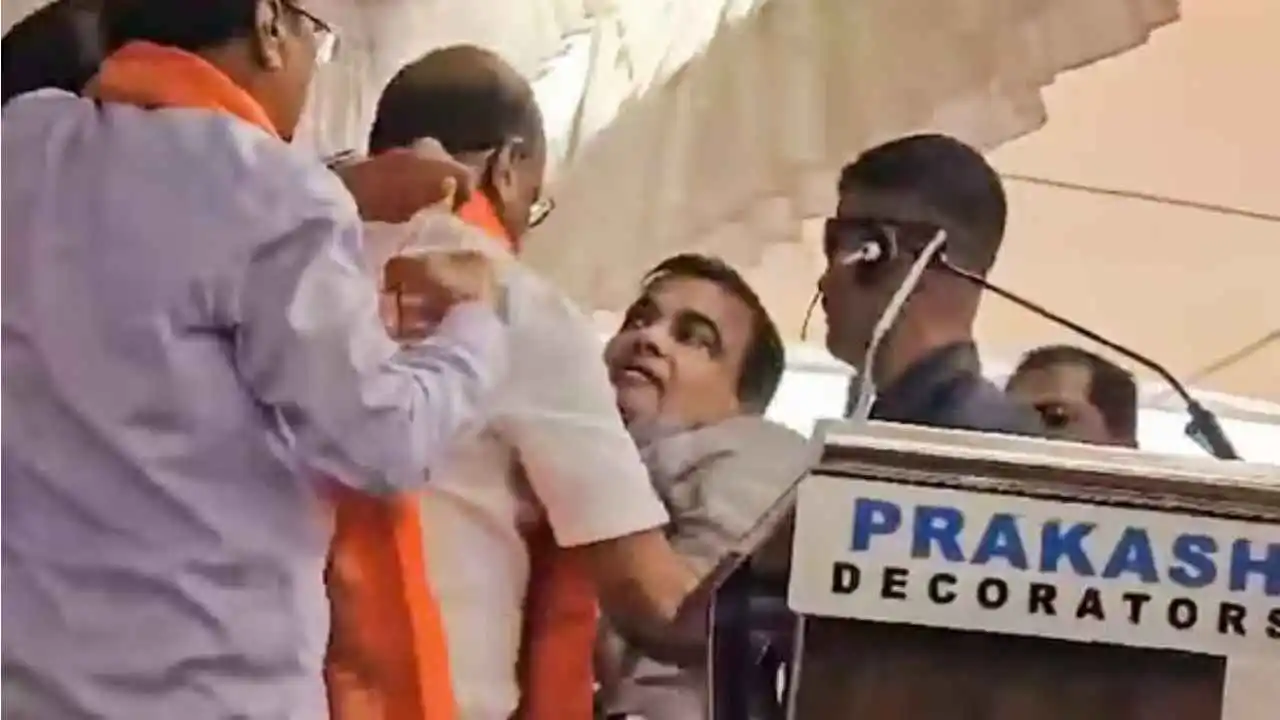
Union Road Transport and Highways Minister Nitin Gadkari collapsed while speaking at an election rally in Maharashtra’s Yavatmal on Wednesday afternoon. Fortunately, the senior Bharatiya Janata Party leader received prompt treatment and was able, after a brief pause, to get back up on stage and continue his speech.
A disturbing video of the incident – which was unfortunately streamed live on X (formerly Twitter), including by his own account – showed Nitin Gadkari being carried away by those on stage, many of whom rushed to form a shield around the BJP leader to give him, and those treating him, some privacy.
Nitin Gadkari took to X and informed that he felt uncomfortable due to the heat during the rally in Pusad, Maharashtra. But now he is completely healthy and is leaving for Varud to attend the next meeting. He thanked his supporters and well wishers for their love and good wishes.
Gadkari, who fought the elections in the first phase of voting as BJP’s candidate from Nagpur Lok Sabha seat, was campaigning for Eknath Shinde-led Shiv Sena leader Rajashree Patil in Yavatmal’s Pusad. Addressing the rally, the union minister said, he was confident that the people of Yavatmal district, which has a constant tendency towards development, will give victory to the BJP-Maha alliance, which believes in all-round development.
Gadkari posted on X that as the nation moves towards a developed India, under the leadership of Prime Minister Narendra Modi, significant work has been done in the last 10 years in the areas of roads and highways as well as health, education and other sectors across the country. He said many schemes of the central government were successfully extended to the rural areas. Due to this, along with the city, the people of the rural areas are also able to benefit from many important facilities.
The Yavatmal constituency along with Akola, Buldhana, Amravati, Hingoli, Wardha, Parbhani and Nanded in Maharashtra are scheduled to vote in the second phase of the Lok Sabha election on April 26.
-
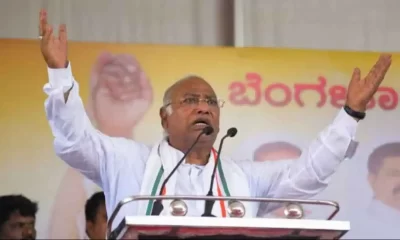
 2024 Lok Sabha Elections16 hours ago
2024 Lok Sabha Elections16 hours agoMallikarjun Kharge vows to continue politics till his last breath to defeat BJP
-
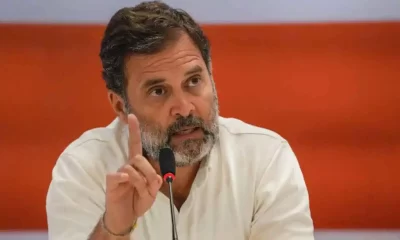
 2024 Lok Sabha Elections23 hours ago
2024 Lok Sabha Elections23 hours agoRahul Gandhi clarifies on wealth survey remark, says aim is to identify injustice
-
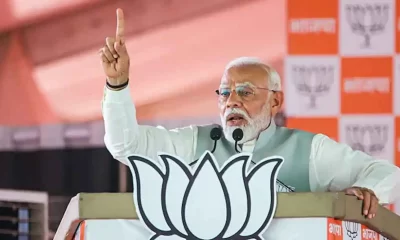
 2024 Lok Sabha Elections20 hours ago
2024 Lok Sabha Elections20 hours agoPM Narendra Modi slams Congress over Sam Pitroda’s inheritance tax remarks, accuses Congress of intending to impose higher taxes
-
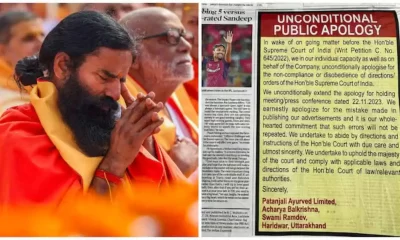
 India News22 hours ago
India News22 hours agoRamdev, Balkrishna publish bigger apology in newspapers after Supreme Court’s rap
-

 Entertainment18 hours ago
Entertainment18 hours agoMadhuri Dixit, Karisma Kapoor recreate Dil To Pagal Hai dance battle on Dance Deewane
-

 2024 Lok Sabha Elections17 hours ago
2024 Lok Sabha Elections17 hours agoNitin Gadkari says he’s better now after collapsing at election rally in Maharashtra’s Yavatmal
-
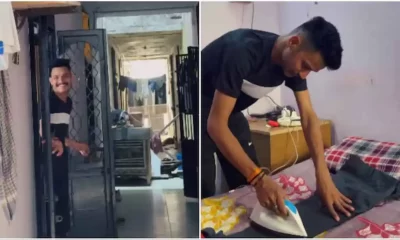
 Trending21 hours ago
Trending21 hours agoA waiter’s life: Social media users go emotional on watching viral video
-

 India News31 mins ago
India News31 mins agoTamannaah Bhatia summoned in illegal IPL streaming app case, to appear before cyber cell on April 29

